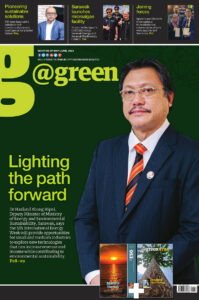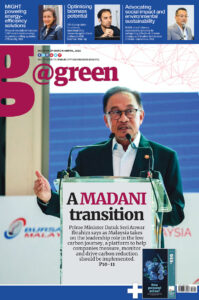Renewable energy sector expected to accelerate State’s economic growth
 As the world population grows and prospers, energy demand also increases. Instead of producing energy from non-renewable hydrocarbons such as coal, oil and gas, many stakeholders now look towards renewable energy sources for a simple reason: sustainability.
As the world population grows and prospers, energy demand also increases. Instead of producing energy from non-renewable hydrocarbons such as coal, oil and gas, many stakeholders now look towards renewable energy sources for a simple reason: sustainability.Sarawak Energy Group CEO Datu Sharbini Suhaili said that the global energy market was evolving, and there has been a clear shift in the demand for renewable energy.

“Governments play a key role in spearheading the sustainable development of renewable energy by endorsing or supporting enabling policies to accelerate the growth of sustainable renewable energy,” Sharbini remarked.
In Sarawak, the renewable energy sector has been identified as one that will accelerate its economic growth. The sector aspires to achieve sustainable growth and prosperity for Sarawak by 2030 as Southeast Asia’s powerhouse through affordable, reliable and renewable energy.
“We take a holistic view of energy development – balancing energy security, sustainability and affordability – is vital to driving socio-economic transformation.
“As a result of the pivot to hydropower development about a decade ago under the Sarawak Corridor of Renewable Energy or SCORE, hydropower development has supported Sarawak’s industrial growth, created job opportunities and enabled Sarawakians to enjoy lowest average power tariffs in Malaysia and amongst the lowest in the region,” said Sharbini.
Sarawak’s renewable energy generation capacity is 3,452MW, out of Malaysia’s total large hydro generation capacity of 5,684MW, from the 108MW Batang Ai Hydroelectric Plant (HEP), 2,400MW Bakun HEP and 944MW Murum HEP.
It will increase by 1,285MW when the ongoing Baleh Hydroelectric Project is completed in 2026.
“This will eventually be counted in Malaysia’s renewable energy target of 31 per cent of renewable capacity by 2025 and the ramp-up to 40 per cent by 2035,” he said.
The challenge now is to attract new sources of finance into this sector.
“With the fast-paced global transition towards renewable energy, business as usual is not an option anymore. More banks are phasing out financing to fossil fuel activities and focusing on sustainable financing.
“Although Sarawak Energy is not a public-listed company, it has demonstrated its commitment to provide transparent corporate reporting for its shareholders and stakeholders by voluntarily disclosing its corporate, operational and sustainability performances through our Annual and Sustainability reports.
“Investors’ demand and expectations have also shifted towards the adoption of ESG (Environmental, Social and Governance) best practices as a critical aspect and incorporating ESG considerations into their investment processes,” he said, adding that transparency is key to attract lenders and investors in making informed decisions.
These are guided by local and international best practices such as Bursa Malaysia’s Listing Requirements, the Malaysian Code on Corporate Governance, Global Reporting Initiative (GRI) Sustainability Reporting Standards, and incorporates recommendations from the Task Force on Climate-related Financial Disclosures.
Sharbini continued: “In 2020, we became the first corporate body in Malaysia to commit to the ‘Business Ambition for 1.5°C’ under United Nations Global Compact, joining another 249 companies around the world at the time.”
“Signatories commit to set a science-based emission reduction target across relevant scopes per the Paris Agreement to pursue efforts to limit the global temperature increase to 1.5°C above pre-industrial levels by 2030.”
In the same year, Sarawak Energy also became the first company in East Malaysia and the utility sector in Malaysia to secure a Sustainable-Linked Loan in the form of a RM100 million revolving credit facility from CIMB Bank Berhad.
He said this loan was linked to measurable sustainability performance targets. It marked another milestone in the company’s ongoing sustainability journey to reaffirm commitment surrounding sustainability, mainly to keep its grid emission intensity in alignment with the Paris Agreement and light up 100 per cent of Sarawak by 2025 under the guidance of the Ministry of Utilities Sarawak.
“In the future, we intend to pursue other forms of ESG financing which extend benefits not just for the company but across the stakeholders including investors and lenders and ultimately improving the company’s profile and reputation,” he added.
Sarawak Energy recently marked a milestone when it signed an interconnection deal with Sabah Electricity Sdn Bhd to share its renewable energy resources and enhance connectivity and economic growth among the Borneo States.
Sharbini said the Power Exchange Agreement and Interconnection Agreement signed between Sabah Electricity Sdn Bhd and Syarikat SESCO Berhad, a subsidiary of Sarawak Energy, marked a historic achievement in the journey towards materialising the Borneo Grid and the broader ASEAN Power Grid.
“The agreements will pave the way for an initial export of 30MW for a term of 15 years via a 31km 275kV double circuit transmission line which will run from Lawas in Sarawak to Mengalong, Sipitang in Sabah and is expected to commence by end 2023.”
“This collaboration brings us a step closer to a sustainable energy future for our people and beyond as we can share our renewable energy resources with our neighbours.”
“It further contributes to the reduction of carbon emissions in the region, as well as ensure energy supply security and bilaterally optimised operation costs while attracting investments for economic transformation in the Borneo region,” he said. — @greenXtra








